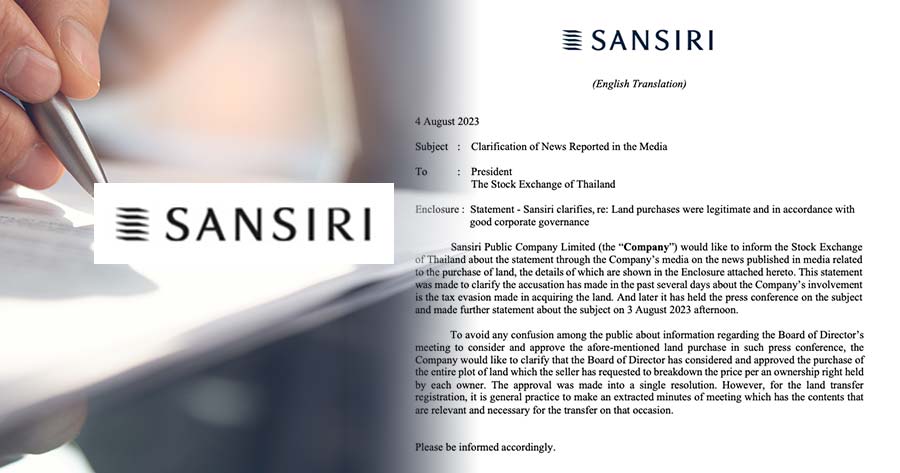Sansiri PLC issued a statement denying public accusation alleging the company was involved in tax evasion in the acquisition of land and caused the state to lose over 500 million baht in revenue. Nonetheless, the issue has casted doubt on Mr.Srettha Thavisin’s suitability in becoming Thailand’s 30th Prime Minister.
The first supporting argument was related to the contract between Sansiri and the land sellers. The contract stated that “the sellers were responsible for the payment of all taxes, fees, and expenses for the transfer of land ownership.” Sansiri was only required to pay the agreed-upon land cost in full. Sansiri goes on to say that the company was in no way involved in the sellers’ activities regarding the payment of taxes and that the company gained no advantage from the sellers’ alleged tax savings.
Second, the company clarifies Mr. Srettha Thavisin’s purchasing authority. The letter said that Mr. Thavisin was not involved in the land acquisition contract arrangements, payments, or transfers in his previous capacity as Sansiri’s CEO and Director. Rather, he granted permission to assess investment value and relevant information before approving the final value of the asset.
Furthermore, the letter claimed that the company carried out separate payment to each deed per request of the sellers. In other words, the company did not advise that the transaction be made in the such a manner. Also, the act did not incur Sansiri’s excessive costs, nor will it influence Sansiri’s land ownership, hence, the conduct was done legally and in compliance with the sellers’ demand.
In addition, the statement said that there were no substantial payments in cash as alleged in any way. The only cash payment was a 301,000-baht land deposit made months before the land transfer registration date. The reason the Department of Lands recorded that “the payment for the land was made by cheque and the remainders in cash” was because the Department of Lands’ usual practice was to record the difference in the cost of land as “payment made in cash” if a copy of the cheque was not presented on the transfer date.
Overall, the company reiterates that such land transfers were completed at the Department of Lands, in line with the relevant laws and regulations. Mr. Thavisin, who was the Chief Executive Officer and Director of Sansiri at the time, had the responsibility of defending the company’s interests and was not involved in, or aware of, the above-mentioned land ownership transfer procedure. Sansiri’s land purchase transactions followed regular standards of real estate business development.





